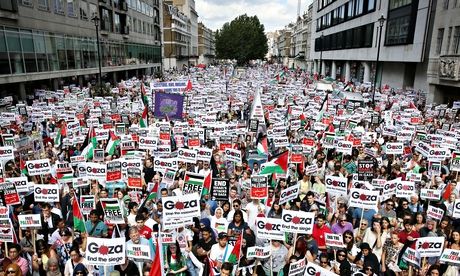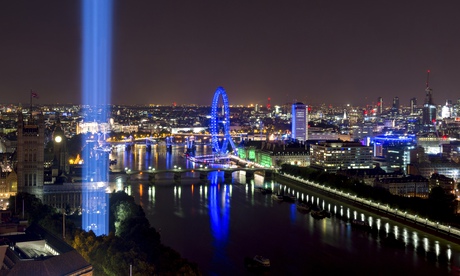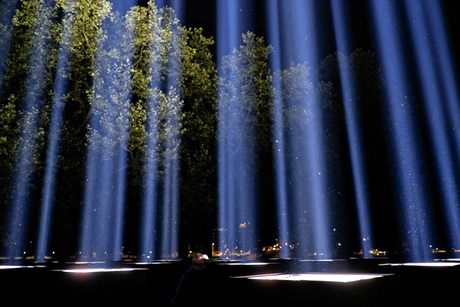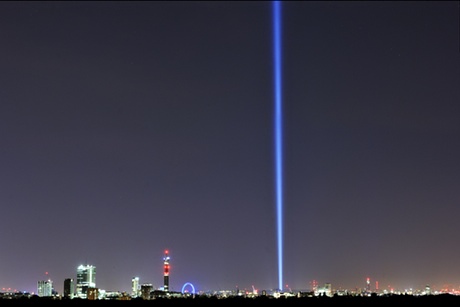Alex Salmond and Alistair Darling have clashed angrily over the fate of the Scotland and its economic prospects in the first head-to-head television debate ahead of next month's independence vote.
An instant ICM poll of viewers for the Guardian said Darling had won the debate by 56% to 44%.
The leaders of the pro-independence and Better Together campaigns fought over Scotland's currency, their track records on financial matters and the best use of the nation's tax revenues.
During the debate, which stretched to over an hour and a half, a combative Darling, for the Better Together campaign, accused Salmond of arguing for independence using "guesswork, fingers crossed and blind faith."
The first minister retorted that the former Labour chancellor had presided over the collapse of the UK economy in 2008, and so could not be believed. "You were in charge of financial regulation when the banks went bust," Salmond said.
During bitter exchanges between the two men, in their first live referendum debate, the first minister found himself under intense pressure from Darling and jeered by some audience members as he swerved questions over his plans for a Scottish currency after independence.
Watched by 350 Scottish voters in Glasgow with just 43 days before September's referendum, Darling was in turn jeered as he dodged questions on Labour's plans to give Scotland full control over income tax and whether he agreed an independent Scotland could be a success.
The long-awaited TV confrontation between the leaders of the yes and no campaigns, staged on STV, came as the channel published a new poll by Ipsos /MORI showing a four point rise in support for independence – evidence that undecided voters were shifted to vote yes, at a decisive moment in the campaign.
The poll recorded a 4% increase in backing for independence, putting the yes vote at 40% compared to 54% for no – a trend which found in other recent polls suggesting another jump in support for independence.
The debate, held at the Royal Conservatoire school of music and drama in Glasgow, sharply intensified after Darling and Salmond were allowed to cross-examine each other, with Darling first subjecting the first minister to a hostile barrage of questions probing Salmond's policy on a currency for an independent Scotland.
As Darling appeared to get the better of Salmond, pressing him on whether he had a "plan B" for a Scottish currency since a sterling pact had been vetoed by all UK parties, the pair clashed angrily over an interview by Darling last year where he said a currency union was "logical and desirable".
The former chancellor accused Salmond of selectively misquoting him, insisting he had also said a post-independence sterling zone was "nonsense on stilts."
Audience members booed as Salmond appeared to dodge the question, as Darling pressed home: "What's your plan B, if you don't get a currency union, this is a most important question."
Salmond cited a report in the Guardian where a UK cabinet minister said he believed that the UK government would agree to a currency union if it lost the referendum, claiming that chancellor George Osborne's veto was a negotiating stance.
Osborne and his opposite number, Ed Balls have since insisted they would veto a sterling pact, with Balls implying he would resign if it was forced on him as Labour chancellor.
Yet Darling too was jeered by pro-independence campaigners as he dodged a question from debate host Bernard Ponsonby about whether Holyrood would get total control of income tax in Scotland: Labour has rejected that proposal, which is backed by the Tories and Lib Dems. Darling said Holyrood would get "substantial" powers over the tax.
Darling said: "I have said to you time and time again all countries can go it alone, provided that they accept the costs and some of the difficulties which come with that."
Alex Salmond began his own interrogation of Darling by asking "why does the no campaign call itself Project Fear?" Going through a serious of ridiculous claims made about the consequences of independence, including that cars would drive on a different side of the road, an increasingly irritated Darling told his opponent that he was "scrabbling around because you can't answer basic questions". He added: "You can't blame me for asking you questions that you have no answer to".
But Salmond regained ground later in another lengthy exchange, in which he repeatedly asked if Darling agreed with David Cameron that Scotland could be a successful independent country.
Repeating, "yes or no?" Salmond joked that he felt like Jeremy Paxman interviewing Michael Howard, to which Darling snapped in response: "You're more like Michael Howard than Jeremy Paxman" before returning to stock phrases that a strong union meant the best of both worlds for generations to come.
Questions from the audience were also dominated by the economy, with Salmond taking the opportunity to remind viewers that "you [Darling] were in charge of financial regulation when the banks went bust". Looking visibly more relaxed taking questions from the audience, Salmond walked out from behind his lectern to address the audience directly. Salmond had won the toss to speak first, and launched a vigorous attack on the growing number of food banks in Scotland and the £100bn he said was committed by the UK government to keep nuclear missiles on the Clyde.
The first minister there were now 35 food banks in the Glasgow area, despite the country's great wealth, while the country was expected to pay £8bn for a nuclear weapons system it had rejected.
Repeating now common themes for the yes campaign, Salmond said for half his lifetime his country had been governed by parties Scotland had not elected, referring to policies such as the poll tax and the bedroom tax, "imposed on us by Westminster that Scottish MPs voted against, but did not have the power to prevent."The first minister said: "My case this evening is this: no one, no one will do a better job of running Scotland than the people who live and work in this country."
Darling retorted in his opening statement that every Scot, and all no voters wanted Scotland to prosper.
He said it was not his patriotism that was being tested, but said independence would fix the fate of future generations. "If we decide to leave, there's no going back," he said. "There's no second chance. For us, the choice is very, very clear. I want to use the strength of the UK to make Scotland stronger. [A] vote against independence isn't a vote for no change."
He said Scotland was being given extra powers on its already substantial devolved powers over income tax and social security – that had been pledged by all three UK party leaders. Darling said: "Let's say it with confidence, let's say it with pride, let's say it with optimism, no thanks to the risks of independence."







